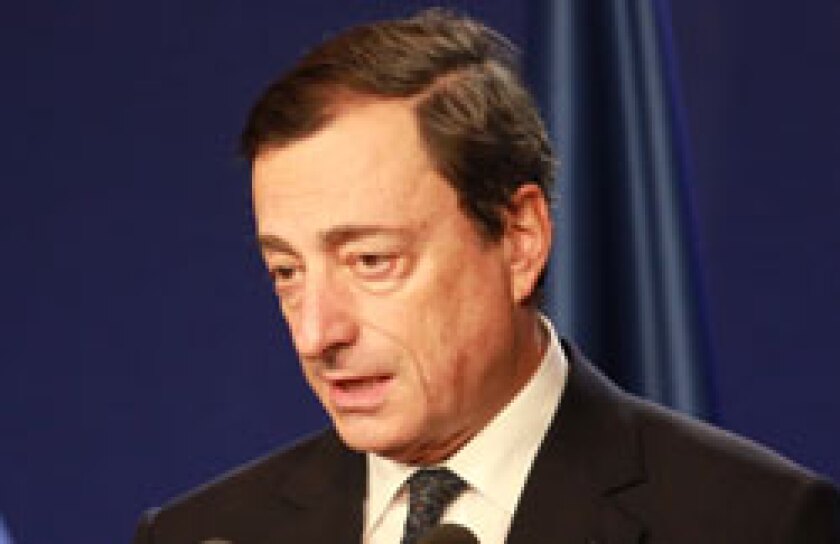The European Central Bank kept its interest rate unchanged at 0.75% in December, as expected, and downgraded its growth projections for the single currency bloc.
“The economic weakness in the euro area is expected to extend into next year,” ECB President Mario Draghi told a news conference.
“The underlying pace of monetary expansion continues to be subdued. Inflation expectations in the euro area remain firmly anchored.”
“Compared with the September 2012 [growth] projections, the ranges for 2012 and 2013 have been revised downwards,” he added.
The eurozone’s economy is expected to shrink between 0.6% and 0.4% this year and is expected by the ECB to either shrink by 0.9% or post meagre growth of 0.3% next year. Growth in 2014 is seen between 0.2% and 2.2%.
“A gradual recovery should start later in 2013,” said Draghi, who cited among factors that could drive the recovery the effects of the central bank’s “accommodative” monetary policy, improved confidence in the financial system and better foreign demand.
“The governing council continues to see downside risks for the euro area” for the near term, Draghi said, mentioning geopolitical issues and fiscal decisions in the US among risks that could possibly dampen sentiment further.
Governments in the eurozone should reduce both their fiscal and structural balances further in order to sustain confidence in the financial markets, he added.
RECORD UNEMPLOYMENT
Unemployment in the eurozone climbed to a new record high of 11.7% in October, as domestic demand remained weak amid governments’ austerity policies and commercial banks’ ongoing deleveraging.
Asked what the ECB’s position was towards unemployment, Draghi said: “this question should be addressed to the policy makers who have created this situation to begin with; we are in this situation also because of the poor, or the lack of, policy making before the crisis.”
The crisis highlighted how the single currency area’s banks were “not properly capitalized” and how fiscal policies in the member states were not sustainable, he added.
“[Unemployment] is a very hard price, but it’s unavoidable,” Draghi said. “The only way to mitigate the impact of the budgetary consolidation, which is contractionary in the short term – and this is something I have always said - is to undertake structural reforms which could increase competitiveness, increase exports and create jobs.”
Some analysts had expected Draghi to hint at further monetary easing, but he noted that the improvement in stock and bond markets over the past few months was a positive development.
“I also highlighted the accommodative monetary policy,” Draghi said. “We will continue looking at the situation, of course, but to some extent we have already done much of what is needed.”
